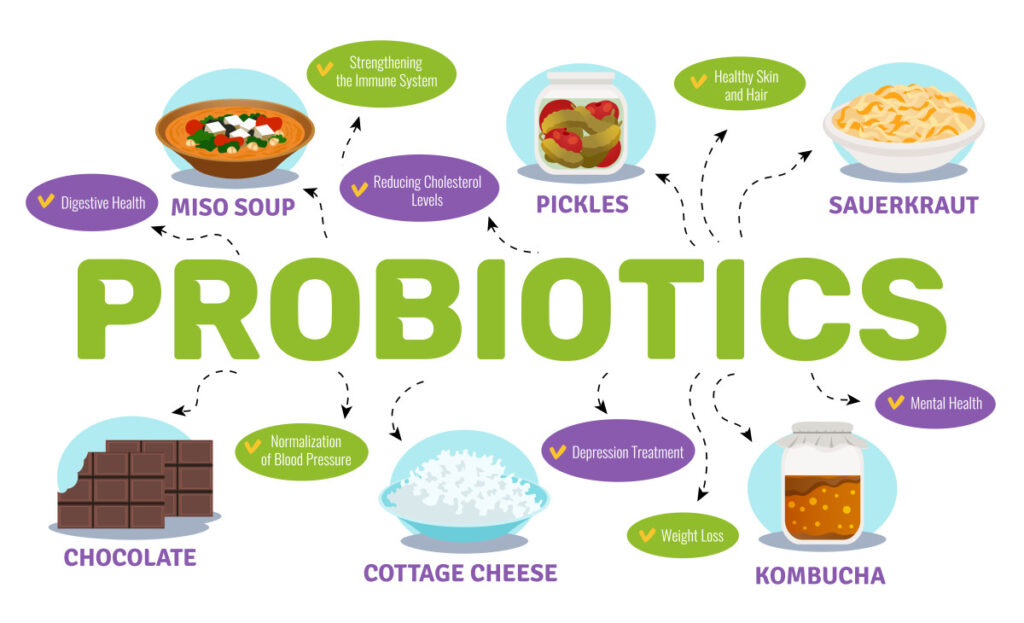
1. Introduction
Definition of probiotics
Probiotics are live microorganisms that are similar to the beneficial microorganisms found in the human gut. These microorganisms are often referred to as “good” or “friendly” bacteria, and they can be consumed through food or supplements. They are believed to have health benefits when consumed in adequate amounts. Probiotics are commonly found in fermented foods like yogurt, kefir, kimchi, sauerkraut, but also in dietary supplements. Probiotics can be made up of various strains of bacteria or yeast, such as Lactobacillus, Bifidobacterium, and Saccharomyces boulardii. Probiotics work by restoring the balance of gut bacteria, helping to improve digestion, boost the immune system, and reduce inflammation in the body.
Importance of gut health and the role of probiotics
Gut health is important for overall well-being. The gut is responsible for digesting food, absorbing nutrients, and maintaining a healthy immune system. A healthy gut also plays a role in mental health, and the gut-brain connection is well documented. When the gut is not functioning properly, it can lead to a number of health problems, such as bloating, constipation, and an increased risk of chronic diseases.
Probiotics play an important role in maintaining gut health by restoring the balance of beneficial bacteria in the gut. The gut microbiome, or the collection of microorganisms that live in the gut, is a delicate ecosystem that can be disrupted by factors such as poor diet, stress, and the use of antibiotics. Probiotics help to increase the number of beneficial bacteria in the gut, which can help to fight off harmful bacteria and viruses. This can improve digestion, boost the immune system, and reduce inflammation in the body.
Probiotics can also help to repair the gut lining and improve gut barrier function. A healthy gut barrier function is important for preventing harmful substances, like toxins, bacteria, and undigested food, from entering the bloodstream and causing inflammation. Additionally, probiotics can help to modulate the immune system, which can help to reduce the risk of allergies and autoimmune diseases.
In summary, maintaining a healthy gut is essential for overall well-being, and probiotics play a crucial role in supporting gut health by restoring balance to the gut microbiome, improving digestion, boosting the immune system, reducing inflammation, and repairing gut lining.
Overview of the benefits of using probiotics for gut health
Probiotics have been found to have a wide range of benefits for gut health. Some of the main benefits include:
- Improving digestion: Probiotics can aid in the breakdown of food and the absorption of nutrients, which can lead to better digestion and less discomfort from bloating or constipation.
- Strengthening the immune system: Probiotics can help to boost the number of beneficial bacteria in the gut, which can help to fight off harmful bacteria and viruses. This can help to reduce the risk of infections and illnesses.
- Reducing inflammation: Probiotics can help to reduce inflammation in the body by balancing the bacteria in the gut and reducing the number of harmful bacteria that can cause inflammation.
- Treating specific health conditions: Probiotics have been shown to be effective in treating a number of specific health conditions, such as Irritable Bowel Syndrome (IBS) and Inflammatory Bowel Disease (IBD), as well as reducing the risk of vaginal yeast infections and urinary tract infections.
- Improving gut barrier function: Probiotics can help to repair the gut lining and improve gut barrier function, which can help to prevent harmful substances from entering the bloodstream and causing inflammation.
- Modulating the immune system: Probiotics can help to modulate the immune system, which can help to reduce the risk of allergies and autoimmune diseases.
It is important to note that not all probiotics are created equal, so it is important to select a high-quality product that contains a variety of different strains of probiotics. Additionally, it is important to understand that probiotics are not a one-size-fits-all solution for gut health, and that diet, exercise and lifestyle are also important factors for maintaining a healthy gut.
2. Improving digestion
How probiotics aid in the breakdown of food
Probiotics aid in the breakdown of food by producing enzymes that help to break down complex sugars, starches, and fibers. These enzymes include lactase, which breaks down lactose (a sugar found in milk and dairy products); amylase, which breaks down carbohydrates; and cellulase, which breaks down fibers. Probiotics also produce short-chain fatty acids (SCFAs) such as acetic acid, propionic acid, and butyric acid, which are important for maintaining a healthy gut and promoting healthy digestion. These SCFAs, help to nourish the cells lining the gut and provide energy for the cells.
Probiotics also help to improve gut motility, which is the movement of food through the digestive system. This can help to prevent constipation and diarrhea, and can also help to reduce bloating and discomfort.
Probiotics also help to improve nutrient absorption by breaking down food, producing enzymes and SCFAs, and by stimulating the production of mucus in the gut. Mucus helps to protect the gut lining from harmful substances and also aids in the absorption of nutrients.
In summary, probiotics aid in the breakdown of food by producing enzymes that help to break down complex sugars, starches, and fibers, by producing short-chain fatty acids (SCFAs) which are important for maintaining a healthy gut and promoting healthy digestion, and by improving gut motility and nutrient absorption.
Absorption of nutrients
Probiotics can help to improve the absorption of nutrients by several different mechanisms.
First, probiotics can help to break down food, as explained earlier, this can make it easier for the body to absorb the nutrients.
Second, Probiotics can also help to produce and release certain vitamins, such as vitamin K and B vitamins, and some minerals such as calcium, magnesium and zinc. These vitamins and minerals are essential for many bodily functions and can have a positive impact on overall health.
Third, Probiotics can also help to improve gut motility and increase the surface area of the gut lining, which can help to increase the absorption of nutrients. A healthy gut lining is important for preventing harmful substances, like toxins, bacteria, and undigested food, from entering the bloodstream and causing inflammation.
Fourth, Probiotics can also help to modulate the immune system, which can help to reduce inflammation in the gut and improve nutrient absorption. Inflammation in the gut can damage the gut lining, making it harder for the body to absorb nutrients.
In summary, Probiotics can aid in the absorption of nutrients by breaking down food, producing and releasing certain vitamins and minerals, improving gut motility, increasing the surface area of the gut lining, and modulating the immune system, which can help to reduce inflammation in the gut and improve nutrient absorption.
Reduction of bloating and constipation
Probiotics can help to reduce bloating and constipation by several different mechanisms.
First, probiotics can help to improve gut motility, which is the movement of food through the digestive system. By improving gut motility, probiotics can help to prevent constipation and diarrhea, and can also help to reduce bloating and discomfort.
Second, probiotics can help to produce short-chain fatty acids (SCFAs) such as acetic acid, propionic acid, and butyric acid, which can help to regulate gut motility and reduce bloating. These SCFAs can also help to nourish the cells lining the gut and provide energy for the cells.
Third, probiotics can help to increase the number of beneficial bacteria in the gut, which can help to balance the gut microbiome. An imbalanced gut microbiome can lead to bloating, constipation, and other digestive issues.
Fourth, probiotics can also help to reduce inflammation in the gut, which can also lead to bloating and constipation. By reducing inflammation, probiotics can help to improve the health of the gut lining and reduce the risk of leaky gut, a condition in which undigested food particles, toxins and bacteria can leak through the gut wall, causing inflammation.
In summary, Probiotics can help to reduce bloating and constipation by improving gut motility, producing short-chain fatty acids (SCFAs), increasing the number of beneficial bacteria in the gut, and reducing inflammation in the gut. By addressing these underlying issues, probiotics can help to improve gut health and reduce the symptoms of bloating and constipation.
3. Strengthening the immune system
The gut as the home of 70% of the immune system
The gut is home to a large portion of the immune system, specifically 70% of the immune system cells are found in the gut, this is known as gut-associated lymphoid tissue (GALT). The gut plays a key role in maintaining overall health and wellness. The gut microbiome, which is the collection of microorganisms that live in the gut, plays an important role in the immune system by helping to identify and fight off harmful pathogens.
The gut microbiome also helps to educate and train the immune system to recognize and respond to harmful pathogens and to distinguish them from harmless ones. This is important for preventing infections and illnesses, as well as for maintaining overall health and wellness.
Probiotics can help to support the immune system by increasing the number of beneficial bacteria in the gut, which can help to fight off harmful bacteria and viruses. This can help to reduce the risk of infections and illnesses. Probiotics can also help to reduce inflammation in the gut, which can help to improve the health of the gut lining and reduce the risk of leaky gut, a condition in which undigested food particles, toxins and bacteria can leak through the gut wall, causing inflammation, and also can help to modulate the immune system, which can help to reduce the risk of allergies and autoimmune diseases.
In summary, the gut is home to 70% of the immune system, and it plays a vital role in maintaining overall health and wellness. The gut microbiome, and probiotics in particular, can support the immune system by increasing the number of beneficial bacteria in the gut, reducing inflammation in the gut and modulating the immune system.
How probiotics boost beneficial bacteria in the gut
Probiotics boost beneficial bacteria in the gut by providing the gut microbiome with a source of live microorganisms that can colonize and grow in the gut. These microorganisms can then compete with harmful bacteria for resources and space, helping to reduce the population of harmful bacteria and increase the population of beneficial bacteria.
Probiotics can also help to improve the health of the gut lining, which can help to prevent harmful substances, like toxins, bacteria, and undigested food, from entering the bloodstream and causing inflammation. A healthy gut barrier function is important for preventing harmful substances, like toxins, bacteria, and undigested food, from entering the bloodstream and causing inflammation.
Probiotics can also help to produce short-chain fatty acids (SCFAs) such as acetic acid, propionic acid, and butyric acid. These SCFAs can help to nourish the cells lining the gut and provide energy for the cells, they can also help to reduce the growth of harmful bacteria and promote the growth of beneficial bacteria.
Lastly, probiotics can also help to modulate the immune system, which can help to reduce inflammation in the gut and improve the health of the gut lining. This can help to create an environment that is favorable for the growth of beneficial bacteria and less favorable for harmful bacteria.
In summary, probiotics boost beneficial bacteria in the gut by providing a source of live microorganisms that can colonize and grow in the gut, by improving the health of the gut lining, by producing short-chain fatty acids (SCFAs), and by modulating the immune system, which can help to reduce inflammation in the gut and improve the health of the gut lining. This can help to create an environment that is favorable for the growth of beneficial bacteria and less favorable for harmful bacteria.
Reduction of infections and illnesses
Probiotics can help to reduce the risk of infections and illnesses by several different mechanisms.
First, probiotics can help to increase the number of beneficial bacteria in the gut, which can help to fight off harmful bacteria and viruses. By reducing the population of harmful bacteria, probiotics can help to reduce the risk of infections and illnesses.
Second, probiotics can also help to strengthen the immune system by modulating the immune system. A healthy immune system is better equipped to fight off infections and illnesses. Probiotics can also help to reduce inflammation in the gut, which can also help to improve the health of the gut lining and reduce the risk of leaky gut, a condition in which undigested food particles, toxins and bacteria can leak through the gut wall, causing inflammation.
Third, probiotics can help to produce and release certain vitamins, such as vitamin K and B vitamins, and some minerals such as calcium, magnesium and zinc. These vitamins and minerals are essential for many bodily functions and can have a positive impact on overall health.
Fourth, probiotics can also help to improve gut motility and increase the surface area of the gut lining, which can help to increase the absorption of nutrients. A healthy gut lining is important for preventing harmful substances, like toxins, bacteria, and undigested food, from entering the bloodstream and causing inflammation.
In summary, probiotics can help to reduce the risk of infections and illnesses by increasing the number of beneficial bacteria in the gut, strengthening the immune system, reducing inflammation in the gut, producing and releasing certain vitamins and minerals, improving gut motility, and increasing the surface area of the gut lining. By addressing these underlying issues, probiotics can help to improve gut health and reduce the risk of infections and illnesses.
4. Reducing inflammation
Link between inflammation and chronic health conditions
Inflammation is a natural response of the immune system to injury, infection, or other forms of stress. It is characterized by redness, heat, swelling, and pain. Acute inflammation is a normal and healthy response to injury or infection, and it helps the body to heal and recover. However, chronic inflammation, which is long-term and persistent, can contribute to the development of chronic health conditions such as heart disease, cancer, diabetes, and autoimmune diseases.
Chronic inflammation can be caused by a variety of factors, such as poor diet, stress, exposure to toxins, and an imbalance in gut bacteria. An imbalance in gut bacteria, known as gut dysbiosis, can lead to an overgrowth of harmful bacteria and a reduction in beneficial bacteria. This can cause inflammation in the gut and can also contribute to systemic inflammation in other parts of the body, through the production of pro-inflammatory compounds called lipopolysaccharides (LPS) that can cross the gut wall.
Additionally, chronic inflammation can also damage the gut lining, leading to a condition known as “leaky gut” which can further contribute to inflammation in the body.
Probiotics can help to reduce inflammation by balancing the bacteria in the gut, reducing the number of harmful bacteria that can cause inflammation and by improving the gut barrier function. Probiotics can also help to modulate the immune system, which can help to reduce the risk of allergies and autoimmune diseases.
In summary, chronic inflammation is associated with an increased risk of chronic health conditions such as heart disease, cancer, diabetes and autoimmune diseases. It can be caused by a variety of factors, including poor diet, stress, exposure to toxins, and gut dysbiosis. Probiotics can help to reduce inflammation by balancing the bacteria in the gut, reducing the number of harmful bacteria that can cause inflammation, improving gut barrier function and modulating the immune system.
How probiotics balance gut bacteria and reduce harmful bacteria
Probiotics balance gut bacteria by providing a source of live microorganisms that can colonize and grow in the gut. These microorganisms can then compete with harmful bacteria for resources and space, helping to reduce the population of harmful bacteria and increase the population of beneficial bacteria.
Probiotics can also help to improve the health of the gut lining, which can help to prevent harmful substances, like toxins, bacteria, and undigested food, from entering the bloodstream and causing inflammation. A healthy gut barrier function is important for preventing harmful substances, like toxins, bacteria, and undigested food, from entering the bloodstream and causing inflammation.
Probiotics can also help to produce short-chain fatty acids (SCFAs) such as acetic acid, propionic acid, and butyric acid. These SCFAs can help to nourish the cells lining the gut and provide energy for the cells, they can also help to reduce the growth of harmful bacteria and promote the growth of beneficial bacteria.
Lastly, probiotics can also help to modulate the immune system, which can help to reduce inflammation in the gut and improve the health of the gut lining. This can help to create an environment that is favorable for the growth of beneficial bacteria and less favorable for harmful bacteria.
In summary, Probiotics balance gut bacteria by providing a source of live microorganisms that can colonize and grow in the gut, by improving the health of the gut
Overall reduction of inflammation in the body
Probiotics can help to reduce inflammation in the body by several different mechanisms.
First, probiotics can help to balance the bacteria in the gut, reducing the number of harmful bacteria that can cause inflammation. Harmful bacteria can release pro-inflammatory compounds called lipopolysaccharides (LPS) which can cross the gut wall and cause systemic inflammation. By reducing the population of harmful bacteria, probiotics can help to reduce inflammation in the gut and throughout the body.
Second, probiotics can also help to improve the health of the gut lining, which can help to prevent harmful substances, like toxins, bacteria, and undigested food, from entering the bloodstream and causing inflammation. A healthy gut barrier function is important for preventing harmful substances, like toxins, bacteria, and undigested food, from entering the bloodstream and causing inflammation.
Third, probiotics can help to produce short-chain fatty acids (SCFAs) such as acetic acid, propionic acid, and butyric acid. These SCFAs can help to nourish the cells lining the gut and provide energy for the cells, they can also help to reduce the growth of harmful bacteria and promote the growth of beneficial bacteria, this can help to reduce inflammation in the gut.
Fourth, probiotics can also help to modulate the immune system, which can help to reduce inflammation in the gut and throughout the body. Probiotics can help to train the immune system to recognize and respond to harmful pathogens and to distinguish them from harmless ones, this can help to prevent infections and illnesses, as well as to reduce inflammation.
In summary, probiotics can help to reduce inflammation in the body by balancing the bacteria in the gut, reducing the number of harmful bacteria that can cause inflammation, improving the health of the gut lining, producing short-chain fatty acids (SCFAs) and modulating the immune system, which can help to reduce inflammation in the gut and throughout the body.
5. Specific health conditions
Treatment of Irritable Bowel Syndrome (IBS) and Inflammatory Bowel Disease (IBD)
Irritable Bowel Syndrome (IBS) and Inflammatory Bowel Disease (IBD) are both conditions that affect the digestive system, but they are caused by different underlying mechanisms. IBS is a functional disorder characterized by abdominal pain, bloating, constipation, and diarrhea, but it does not cause inflammation or damage to the gut lining. IBD, on the other hand, is a group of inflammatory conditions that cause damage to the gut lining and can lead to symptoms such as abdominal pain, diarrhea, and weight loss.
Probiotics have been shown to be effective in the treatment of both IBS and IBD. For IBS, probiotics can help to reduce bloating and constipation by improving gut motility, producing short-chain fatty acids (SCFAs), increasing the number of beneficial bacteria in the gut, and reducing inflammation in the gut. Additionally, probiotics have been shown to help reduce symptoms of IBS such as abdominal pain, bloating, and diarrhea, by modulating the immune system and improving gut barrier function.
For IBD, probiotics can help to reduce inflammation by balancing the bacteria in the gut, reducing the number of harmful bacteria that can cause inflammation, and by improving the gut barrier function. Probiotics have also been shown to be effective in reducing the symptoms of IBD such as abdominal pain, diarrhea and weight loss.
Reduction of vaginal yeast infections and urinary tract infections
Probiotics can help to reduce the risk of vaginal yeast infections and urinary tract infections (UTIs) by several different mechanisms.
First, probiotics can help to balance the bacteria in the vagina and urinary tract, reducing the population of harmful bacteria that can cause infections. Yeast infections are often caused by an overgrowth of the fungus Candida, which can occur when the natural balance of bacteria in the vagina is disrupted. Probiotics can help to restore this balance by increasing the population of beneficial bacteria, such as Lactobacillus, which can help to suppress the growth of Candida.
Similarly, UTIs are often caused by bacteria such as Escherichia coli (E. coli), and probiotics can help to reduce the population of these harmful bacteria by increasing the population of beneficial bacteria.
Second, probiotics can also help to improve the health of the gut and the immune system, which can help to reduce the risk of infections. A healthy gut is important for preventing harmful substances, like toxins, bacteria, and undigested food, from entering the bloodstream and causing inflammation. A healthy immune system is better equipped to fight off infections.
Third, probiotics can also help to produce and release certain vitamins, such as vitamin K and B vitamins, and some minerals such as calcium, magnesium and zinc. These vitamins and minerals are essential for many bodily functions and can have a positive impact on overall health.
In summary, probiotics can help to reduce the risk of vaginal yeast infections and UTIs by balancing the bacteria in the vagina and urinary tract, reducing the population of harmful bacteria that can cause infections, improving the health of the gut and the immune system, and producing and releasing certain vitamins and minerals that are essential for overall health. It’s important to note that probiotics are not a substitute for traditional medical treatment of these conditions and it’s always recommended to consult a healthcare professional before starting a probiotic supplement regimen. Additionally, research on the use of probiotics for these conditions is still ongoing, and more studies are needed to fully understand their potential benefits and any possible side effects.
6. Incorporating probiotics
Sources of probiotics (foods and supplements)
Probiotics can be found in a variety of foods and supplements. Some of the most common sources of probiotics include:
- Fermented foods: Foods such as yogurt, kefir, sauerkraut, kimchi, and pickles are all sources of probiotics. These foods are made by fermenting various fruits and vegetables, which allows beneficial bacteria to grow and thrive.
- Dairy products: Many types of dairy products like yogurt, cheese and milk are good sources of probiotics.
- Supplements: Probiotic supplements are available in various forms such as capsules, tablets, powders, and liquids. These supplements usually contain specific strains of probiotics, such as Lactobacillus acidophilus and Bifidobacterium bifidum, which can be found in fermented foods.
- Non-dairy alternatives: Non-dairy alternatives such as soy milk, almond milk, and coconut milk can also be fermented to create probiotic-rich foods.
- Miso: Miso is a traditional Japanese seasoning made from soybeans, salt, and koji (a type of fungus). It’s rich in probiotics and enzymes.
It’s important to note that the probiotic content of food sources can vary depending on the preparation method, storage conditions and also the probiotic strains present might not always be the same. Some people with specific health conditions or taking certain medications might need to consult with a healthcare professional before consuming probiotics.
Buy some products
- NewRhythm Probiotics 50 Billion CFU 20 Strains, 60 Veggie Capsules, Targeted Release Technology, Stomach Acid Resistant, No Need for Refrigeration, Non-GMO, Gluten Free
- Culturelle Pro Strength Daily Probiotic for Women & Men – 60 Count – Digestive Health Capsules, Naturally-Sourced Probiotics for Digestive Health and Immune Support – Gluten Free & Soy Free, Non-GMO
- Nature’s Bounty Acidophilus Probiotic, Daily Probiotic Supplement, Supports Digestive Health, 1 Pack, 120 Tablets
Importance of selecting a high-quality product
Selecting a high-quality probiotic product is important for several reasons:
- Potency: Not all probiotic products contain the same number of live microorganisms. High-quality products should have a high potency, meaning they contain a sufficient number of live microorganisms to be effective.
- Strain specificity: Different strains of probiotics have different effects on the body. High-quality products should list the specific strains of probiotics they contain, and not just the genus and species.
- Stability: Probiotics are living microorganisms and they can be sensitive to heat, light, and moisture. High-quality products should be manufactured and stored under conditions that ensure the stability of the probiotics.
- Purity: Some probiotic products may contain contaminants such as bacteria, fungi, or heavy metals. High-quality products should be tested for purity and should be free of contaminants.
- Third-party testing: Some manufacturers might exaggerate the numbers of probiotics present in their products. Third-party testing by independent laboratories can verify the probiotic content of a product.
- Quality control: High-quality products should be manufactured according to good manufacturing practices (GMP) and should be subject to regular quality control testing to ensure the probiotic content and purity of the product.
In summary, selecting a high-quality probiotic product is important to ensure that the product is effective, safe, and free of contaminants. It’s important to check the label for the specific strains of probiotics present and also look for third-party testing and GMP certification. It is always recommended to consult a healthcare professional before starting a probiotic supplement regimen.
Buy some product
- Physician’s CHOICE Probiotics 60 Billion CFU – 10 Diverse Strains Plus Organic Prebiotic, Designed for Overall Digestive Health and Supports Occasional Constipation, Diarrhea, Gas & Bloating
- Garden of Life Dr. Formulated Probiotics for Women & Prebiotics, 50 Billion CFU for Women’s Daily Digestive Vaginal & Immune Health, 16 Probiotic Strains Shelf Stable No Gluten Dairy Soy, 30 Capsules
- 𝗪𝗜𝗡𝗡𝗘𝗥 Probiotics for Women & Men – Probiotics Digestive Health with Natural Lactase Enzyme – 62% More Stable Probiotic for Gut Health Support – USA Made Vegan Probiotics Formula Prebiotic Blend
7. Conclusion
Summary of the benefits of using probiotics for gut health
Probiotics are beneficial microorganisms that can help to improve gut health by:
- Balancing the gut microbiome: Probiotics provide a source of live microorganisms that can colonize and grow in the gut, competing with harmful bacteria for resources and space, helping to reduce the population of harmful bacteria and increase the population of beneficial bacteria.
- Improving gut barrier function: Probiotics can help to improve the health of the gut lining, which can help to prevent harmful substances, like toxins, bacteria, and undigested food, from entering the bloodstream and causing inflammation.
- Producing short-chain fatty acids (SCFAs): Probiotics can help to produce SCFAs such as acetic acid, propionic acid, and butyric acid, which can help to nourish the cells lining the gut and provide energy for the cells, they can also help to reduce the growth of harmful bacteria and promote the growth of beneficial bacteria.
- Modulating the immune system: Probiotics can help to modulate the immune system, which can help to reduce inflammation in the gut and improve the health of the gut lining.
- Reducing the risk of infections and illnesses: Probiotics can help to reduce the risk of infections and illnesses by increasing the number of beneficial bacteria in the gut, strengthening the immune system, reducing inflammation in the gut, producing and releasing certain vitamins and minerals, and improving gut motility.
- Treating IBS and IBD: Probiotics have been shown to be effective in the treatment of Irritable Bowel Syndrome (IBS) and Inflammatory Bowel Disease (IBD) by reducing bloating, constipation, diarrhea, abdominal pain, and inflammation.
- Reducing the risk of vaginal yeast infections and UTIs: Probiotics can help to reduce the risk of vaginal yeast infections and urinary tract infections (UTIs) by balancing the bacteria in the vagina and urinary tract, reducing the population of harmful bacteria that can cause infections, improving the health of the gut and the immune system, and producing and releasing certain vitamins and minerals that are essential for overall health.
Importance of incorporating probiotics into daily routine for overall well-being.
Incorporating probiotics into your daily routine can have a positive impact on overall well-being by:
- Maintaining a healthy gut: The gut microbiome plays a crucial role in overall health and well-being. Incorporating probiotics into your daily routine can help to maintain a healthy gut by balancing the gut microbiome, improving gut barrier function, and reducing inflammation.
- Boosting the immune system: Probiotics can help to modulate the immune system, which can help to reduce the risk of infections and illnesses.
- Improving digestion: Probiotics can help to improve digestion by breaking down food, absorbing nutrients, reducing bloating and constipation, and improving gut motility.
- Reducing stress: Probiotics have been shown to have a positive impact on mental health by reducing stress, anxiety and depression.
- Enhancing nutrient absorption: Probiotics can help to improve the absorption of nutrients by breaking down food, absorbing nutrients, and producing short-chain fatty acids (SCFAs).
- Improving skin health: Probiotics can also help to improve skin health by reducing inflammation, improving skin barrier function, and reducing the risk of acne.
Incorporating probiotics into your daily routine can also have a positive impact on overall well-being by maintaining a healthy gut, boosting the immune system, improving digestion, reducing stress, enhancing nutrient absorption, and improving skin health. It’s always recommended to consult a healthcare professional before starting a probiotic supplement regimen and also to include probiotic-rich foods in diet.
image credit: Image by macrovector on Freepik
Image by bearfotos on Freepik











